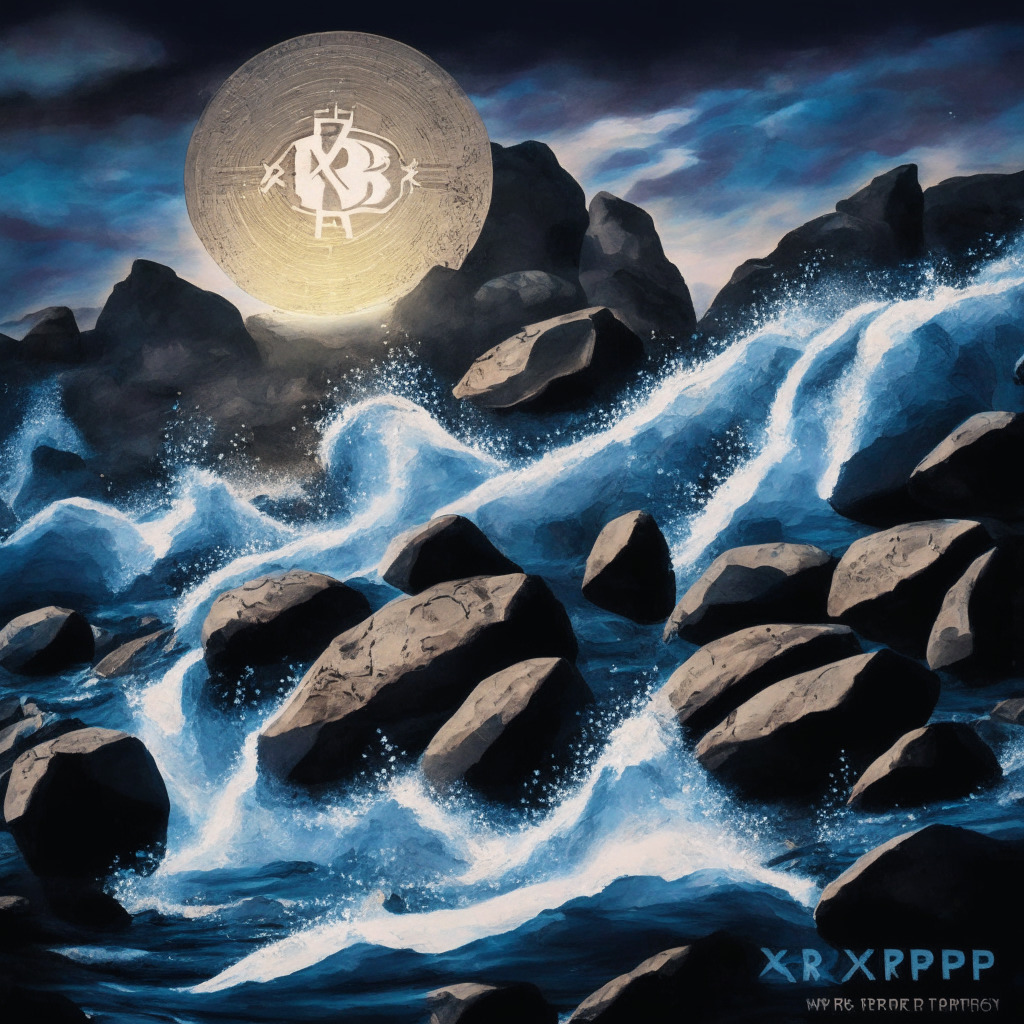The South Korean central bank (BOK) plans to upgrade its payment systems with a focus on Central Bank Digital Currency (CBDC). Innovations like real-time gross settlement aim to enhance real-time transfers. However, operational risks from digital transformations have prompted BOK to strengthen oversight for secure transactions. Preparatory steps for the CBDC explore possibilities of smart contracts, offline payments, and cross-border transactions.
Search Results for: Central Bank
Predicting an Era of Central Bank Digital Currencies: Future Boon or Crypto Bale?
“Switzerland-based BIS predicts the issuance of as many as 15 retail Central Bank Digital Currencies (CBDCs) by decade’s end, with 93% of Central Banks globally involved in CBDC research, planning and piloting. The trend towards CBDCs might bridge the financial gap among the unbanked worldwide, but raises questions about traditional cryptocurrencies’ value as CBDCs would be government-controlled.”
The Gathering Momentum of Central Bank Digital Currencies: Promise and Uncertainty
“Recent research reveals 93% of central banks are actively looking into Central Bank Digital Currencies (CBDCs). Despite this interest, 68% claim they aren’t ready to release their own digital currency soon. Emerging markets, aiming for financial inclusion, lead CBDC adoption.”
15 Central Bank Digital Currencies by End of Decade: A New Era of Finance or Privacy Threat?
By the end of this decade, around 15 retail central bank digital currencies (CBDCs) could be globally available, covering nearly 95% of the world economy according to BIS. This emerging technology can offer significant benefits, but also brings challenges like privacy concerns.
Navigating the Future: Exploring Central Bank Digital Currencies with Dilip Rao
“Former Ripple executive Dilip Rao, leading Australia’s exploration into Central Bank Digital Currencies (CBDCs), believes CBDCs might address future, unforeseen financial challenges. However, successful adoption relies on user-perceived value. This digital currency implementation in Australia could require popular support for changes to existing laws.”
Fed Chair Powell Pushes for Central Bank-Regulated Stablecoins: Innovation vs Security Debate
Federal Reserve Chair Jerome Powell emphasizes the need for a strong federal presence in stablecoin supervision during a monetary policy hearing, asserting the central bank’s crucial role in oversight. As the crypto landscape evolves, creating a regulatory framework that balances stablecoins’ potential benefits and investor protection is vital for future success.
XRP’s Struggle for Stability Amid Bullish Wave and Central Bank Partnerships
XRP is experiencing a slight uptick, trading above $0.48, amid a bullish wave in the crypto market. Ripple’s CBDC Platform is being evaluated by the Central Bank of Colombia for potential efficiency, backed by the energy-efficient, open-source XRP Ledger. However, XRP price recovery is facing challenges due to resistance at key levels and the unresolved SEC lawsuit.
Ripple Partners with Colombian Central Bank for CBDC Pilot: Exploring Benefits and Challenges
Ripple partners with Colombia’s central bank and MinTIC to experiment with central bank digital currency (CBDC) technology using Ripple’s CBDC platform. This pilot aims to enhance Colombia’s high-value payment system but doesn’t confirm the country’s intention to launch a CBDC.
Colombia’s Central Bank and Ripple Explore Blockchain Benefits: Pros, Cons and Conflicts
Colombia’s central bank, Banco de la República, partners with Ripple and MinTIC in a blockchain experimentation phase aimed at enhancing the national high-value payments system. Despite potential benefits, concerns about overdependence and centralization of power remain.
Hong Kong Central Bank Pushes for Crypto Adoption: Pros, Cons, and Conflicts in the Financial World
The Hong Kong Monetary Authority (HKMA) is pressuring major banks like HSBC and Standard Chartered to accept crypto exchanges as clients, highlighting growing cryptocurrency acceptance and the need for traditional financial institutions to adapt to this evolving landscape.
Balancing Privacy and Transparency: Pros and Cons of a US Central Bank Digital Currency
The U.S. Treasury Department explores Privacy Enhancing Technologies (PETs) to protect privacy and anonymity in potential digital dollar transactions. As the U.S. considers introducing a Central Bank Digital Currency (CBDC), addressing risks and striking a balance between privacy and transparency remain top priorities for policymakers.
UAE Central Bank’s Crypto Guidelines: Balancing Security and Innovation
The Central Bank of the UAE has issued new guidelines targeting anti-money laundering and counter-terrorism financing within cryptocurrencies and NFTs. These regulations apply to licensed financial institutions and emphasize the risks and legal obligations associated with dealing with cryptocurrencies.
Cryptocurrency Debate in Russia: Central Bank’s Ban vs Finance Ministry’s Regulation Approach
In Russia, cryptocurrencies are considered too risky for most but suitable for professional investors, according to Ivan Chebeskov, director of the financial policy department at the Finance Ministry. While acknowledging the high-risk nature of cryptocurrencies, Chebeskov emphasized their potential for investment. Tensions arise between the Central Bank’s focus on banning cryptocurrencies and the Finance Ministry’s push for regulation and taxation, resulting in an uncertain future for Russia’s crypto market.
Hong Kong and UAE’s Central Banks Collaborate on Blockchain: CBDCs, mBridge, and Virtual Assets
Hong Kong and the UAE central banks are strengthening financial cooperation, focusing on virtual asset regulation and integrating central bank digital currencies (CBDCs) for cross-border trade transactions. The countries are collaborating on mBridge, a blockchain supporting multiple CBDCs, promising progress despite political complexities.
Retail CBDCs: Exploring Benefits, Challenges, and the Future of Central Bank Digital Currencies
The Bank for International Settlements (BIS) published a paper on retail central bank digital currencies (CBDCs) as central banks worldwide explore their potential. Retail CBDCs, designed for public use, could support monetary and financial stability but also face concerns including political interference, financial instability, and data privacy.
Norway’s Central Bank Pushes for National Crypto Strategy Amid EU’s MiCA Regulation
Norway’s central bank, Norges Bank, urges the country to develop a national crypto regulation strategy as the EU’s MiCA regulation approaches. Despite MiCA’s focus on consumer protection and market integrity, it lacks comprehensive decentralized finance regulation. Norges Bank emphasizes the importance of understanding the evolving crypto landscape to foster responsible growth and innovation.
Fed’s Actions and Crypto Market: How Jerome Powell’s Remarks Impact BTC and Central Banks
Amid mixed crypto market expectations, US Fed Chairman Jerome Powell discussed the US banking system’s strength and resilience to support liquidity without compromising monetary policy. Investors must stay vigilant as decisions made by the Fed and central banks’ involvement in cryptocurrency could impact market sentiment and regulations.
Ripple’s CBDC Platform: Bridging XRP and Central Banks or Stirring Controversy?
Ripple Lab recently launched Central Bank Digital Currency (CBDC) platforms for stablecoin and CBDCs development, using the XRP Ledger (XRPL) technology. Ripple’s CTO, David Schwartz, emphasized XRPL’s importance as the core ledger technology, while addressing concerns on XRP integration with central bank digital currency platforms and potential regulatory hurdles.
Ripple CBDC Platform: Revolutionizing Central Bank Digital Currencies or Risking Control?
Ripple is launching a unique platform for central bank digital currencies (CBDCs), empowering governments and financial institutions to design and develop digital currencies with ease. Leveraging Ripple’s Private Ledger, the platform enables instant settlement for domestic and cross-border payments, improving user experience in transactions.
Ripple’s CBDC Platform: Pioneering Digital Currency for Central Banks & Challenging Traditional Finance
Ripple is developing a platform for central banks, governments, and financial institutions to issue their own central bank digital currency (CBDC), offering benefits like minting, distribution, and accessibility in areas with limited internet connectivity. The platform will be tested within the e-HKD pilot program, highlighting its real-world potential and versatility.
Bank Collapses Threaten Crypto: Pros and Cons of Direct Central Bank Access for EMT Issuers
This article discusses the risks associated with bank failures and the crypto market, highlighting the dependency of stablecoin issuers on banking partners for fiat settlement. It suggests granting e-money institutions direct access to central bank accounts, like in the UK and Lithuania, to increase safety, foster payment innovation, and reduce banking risks.
G-7 Finance Ministers Embrace Crypto Regulation and Central Bank Digital Currencies
The G-7 finance ministers discussed their commitment to regulating crypto-assets and exploring central bank digital currencies (CBDCs) in a recent meeting. They emphasized the need for effective regulatory frameworks while supporting innovation and addressing potential risks to the monetary and financial system.
Central Banks Vetoing Stablecoins: Balancing Innovation and Financial Stability in the EU
EBA Chair José Manuel Campa emphasizes the need for stablecoins to adhere to sensible guardrails, as central banks should have the right to veto if they threaten monetary policy or financial stability. MiCA’s introduction will regulate all crypto-related activities in the EU, ensuring stablecoin issuers comply with vital regulations while considering central banks’ role.
Central Banks’ Veto Powers and Stablecoin Risks: Safeguarding Financial Stability in a MiCA Future
European Banking Authority Chair José Manuel Campa calls for central bank veto powers over large stablecoins, citing concerns for financial stability and public policy. The upcoming Markets in Crypto Assets (MiCA) regulation sets guidelines and requirements for stablecoin issuers, including stringent authorization and supervision processes.
Unbacked Cryptocurrencies: Ponzi Schemes or Legit Investments? Central Bank’s Dilemma
Central Bank of Ireland Governor Gabriel Makhlouf likens unbacked cryptocurrencies to a “Ponzi scheme” and emphasizes the importance of differentiating between ‘backed’ and ‘unbacked’ crypto. The recent approval of MiCA by the European Parliament marks a significant step in cryptocurrency regulation, acknowledging the potential of cryptocurrencies while protecting consumers and investors from unwarranted risks.
Central Banks’ Role in Crypto: Innovation vs Regulation & the Global Cryptocurrency Debate
As we reach mid-2023, the role of central banks in the growing cryptocurrency market sparks debate among enthusiasts. Topics include active involvement in adopting digital currencies versus a hands-off approach, establishing a global cryptocurrency, and potential repercussions on worldwide economic balances. The future of blockchain relies on innovation, collaboration, and risk consideration.
Exploring Privacy and Fraud Prevention in Central Bank Digital Currencies (CBDCs)
Central Bank Digital Currencies (CBDCs) are gaining traction as a promising solution for financial institutions worldwide. Quant, a UK-based company, is working on CBDC development, focusing on privacy while upholding Anti-Money Laundering (AML) and Know Your Customer (KYC) measures. Collaborating with the Bank of England, the potential digital pound aims to address fraud and financial crime effectively while balancing privacy concerns.
Argentina’s Central Bank Crypto Ban: Impact on Hyperinflation and Industry Growth
The Central Bank of Argentina has prohibited payment providers from facilitating crypto transactions to minimize the country’s payment system exposure to digital assets. This decision affects all coins and tokens in Argentina, potentially impacting the nation’s growing crypto industry amidst ongoing economic crisis and hyperinflation. Argentina’s fintech community remains skeptical about this stance.
Blockchain vs. Central Banking: Finding Clarity Amid Economic Ambiguity & The Human Element
The recent ambiguous messaging from the Federal Reserve has left markets craving clarity in policy-setting, highlighting the potential benefits of replacing human institutions with decentralized cryptographic monetary systems like Bitcoin. However, the complexity of the global economy demands flexibility and uncertainty in decision-making, still requiring a human touch. Policymakers should consider utilizing blockchain technology and cryptographic verification systems to provide critical clarity, transparency, and trust in the financial system.
Nigeria’s National Blockchain Policy: Hope for Crypto Amid Central Bank Resistance
The Nigerian Federal government approved a “national blockchain policy” after consultation with 56 institutions and personalities. This move indicates the institutionalization of blockchain technology in Nigeria. However, the Central Bank’s stance on privately issued digital currencies remains a roadblock, impacting the future of the Nigerian blockchain and cryptocurrency space.
Digitalization and Trust: How Central Bank Money Retains Dominance Amid Crypto Debate
Digitalization is shaping the future of money with new currencies emerging, but Moody’s report suggests traditional central bank money in commercial banks will remain dominant due to trust. Digital wallets, Central Bank Digital Currencies (CBDCs), and cryptocurrencies face challenges, including technical and policy complexities, while trust in central banks maintains their significance in the monetary landscape.
Fed Rate Hikes: Sign of Economic Strength or Overreliance on Central Bank Control?
The U.S. Federal Reserve raised the federal funds rate to tackle inflation, leading to a rise in stock indexes, precious metals, and crypto markets. With uncertainties surrounding the U.S. debt limit and global economy, it’s vital to weigh the pros and cons of the Fed’s actions.































